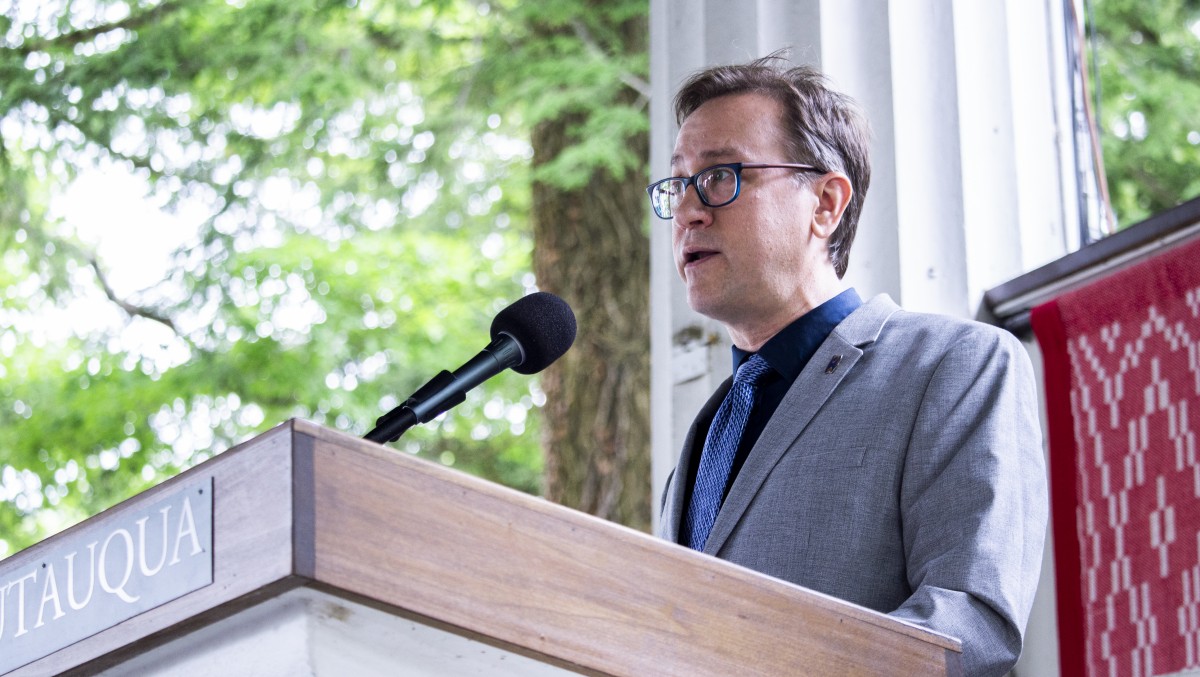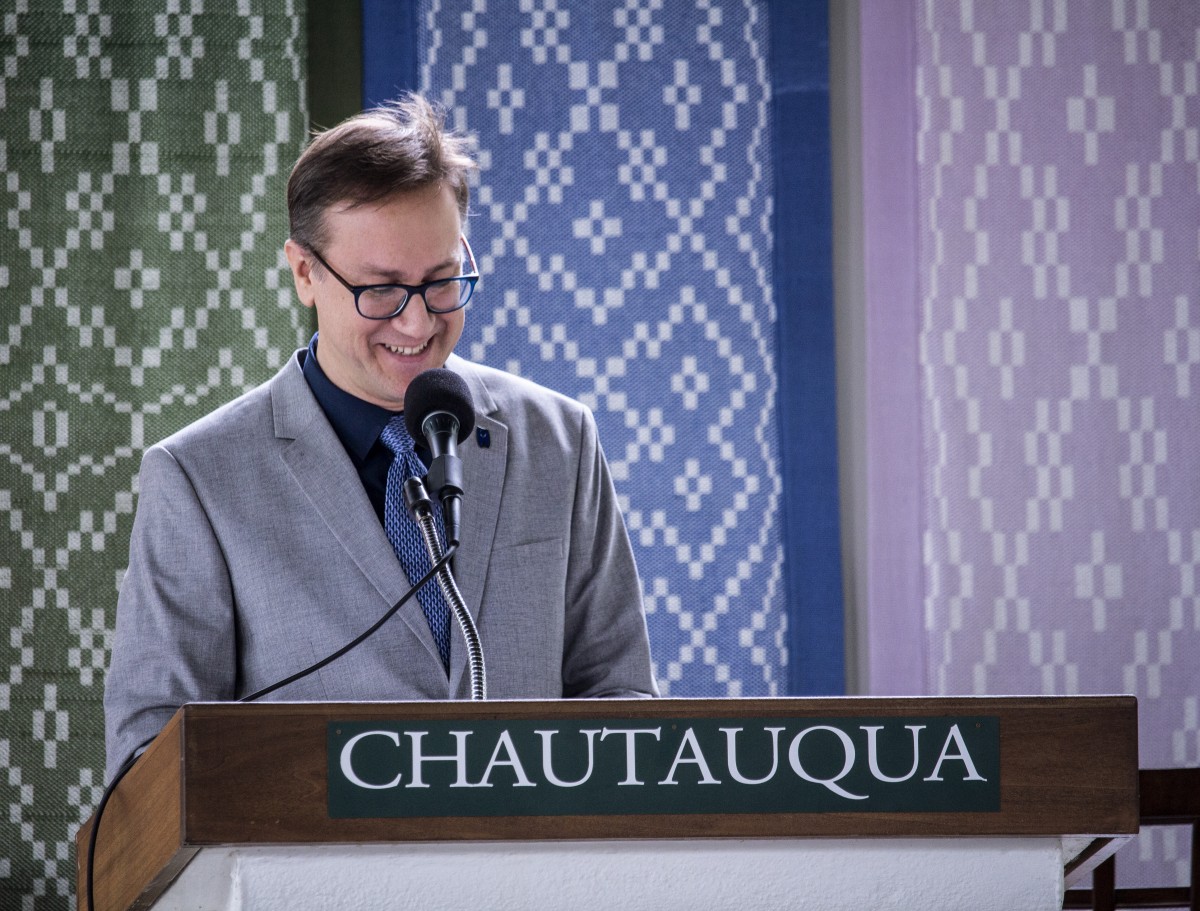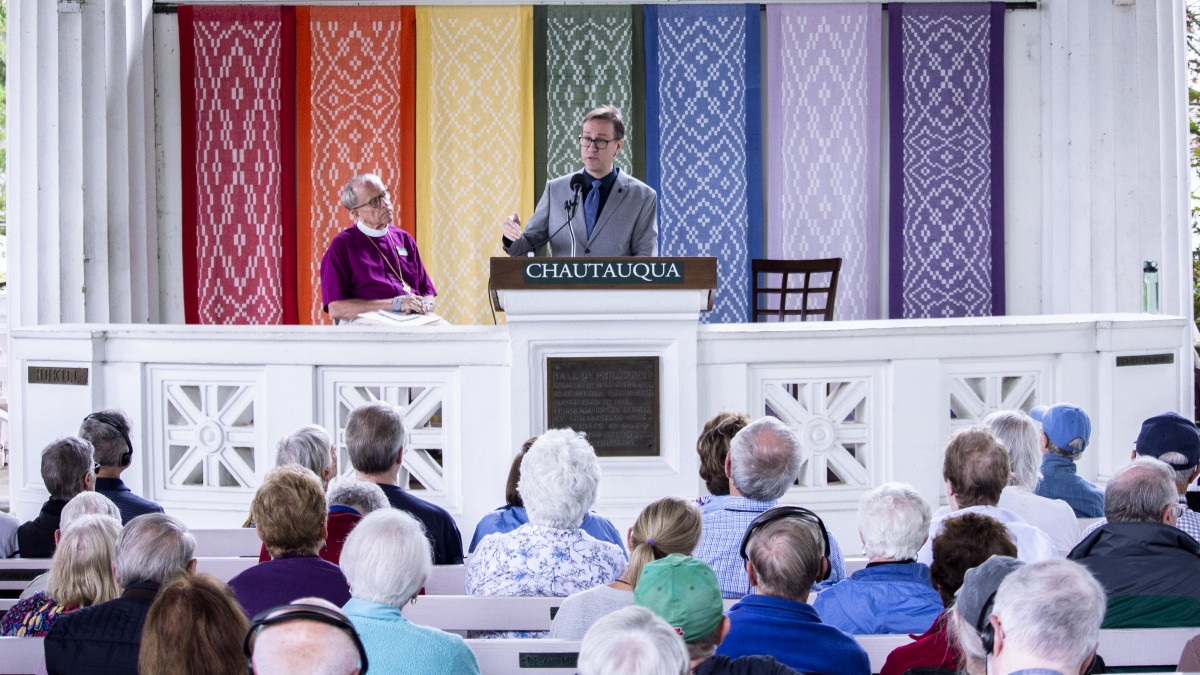To continue the Interfaith Friday Series in the Hall of Philosophy, the Rt. Rev. V. Gene Robinson, vice president of religion and senior pastor, posed a series of questions to Roy Speckhardt, who spoke on behalf of humanism.
Speckhardt is an author and executive director of the AHA. He has appeared on “Good Morning America,” CNN and Fox News as a commentator and regularly writes for The Huffington Post. He earned his bachelor’s degree from Mary Washington College and his master’s degree from George Mason University.
As an executive director of the American Humanist Association, Speckhardt promotes progressive political issues through the lens of humanist beliefs. He has also written a book called Creating Change Through Humanism.
What follows is an abridged version of Speckhardt’s conversation with Robinson. Speckhardt and Robinson’s remarks have been condensed for clarity.
Robinson: Are we wrong to say that we have nine faith traditions speaking on our interfaith program, or do we have eight, plus something else?
No, that’s a fair point. When I see a lot of my colleagues and other humanists embrace words like faith, they say, “We have faith in humanity, we have faith in science conclusions,” and so forth. But, I’m a little more of a stickler on that personally because I don’t want to be unclear in what I’m saying. I don’t want people to think I mean something other than what I say. So, I try to use language that speaks directly to the heart of where I get my thinking. And so, I do avoid that type of religious language, but certainly other humanists do use such religious language and it’s not necessarily a problem. They just define them a little differently.
So, is a humanist a friendlier kind of atheist?
I think that is not a bad statement. Most humanists do identify as atheist or, if they don’t use that word, they use the definition. They don’t happen to have a belief system that includes gods, but humanists really do have a grounding, not just in reason and science as our epistemology for where we get our answers — the best place of modern knowledge — but also this grounding in compassion and egalitarianism that I think are both drawn from empathy. And, those are critical parts of what makes humanism, humanism. You know, the compassion, egalitarianism and reason together make the humanism.
So when you say, “Some humanists might say they have faith in humanity,” isn’t there an awful lot of evidence to suggest that humanity’s not doing a good job, and therefore that’s not a very hopeful thing to put your faith in?
It’s true. I wonder whether my optimistic “faith,” if you want to use that word, came first or some of the evidence that I found came first in my thinking, but there is actually a lot of evidence about (Steven) Pinker’s work. Cognitive scientist; Harvard professor; 2006 humanist of the year, Steven Pinker explains how we’re progressing to a better, less violent world community. He highlights cosmopolitanism as a key force in this shift; a cosmopolitanism that he defines as something that can prompt people to take the perspectives of people unlike themselves, and expand their circle of sympathy to embrace them — essentially an expression of empathy. But, others have done this work as well. If you look at the arc of history — not just the last 10 years, not just the last 50 years, but the last hundreds of years — you can see the progress that’s happening, and it’s not a direct line, and we have a lot of setbacks and backlashes, but we are moving ahead.
“The good in this world… is no evidence of a divinely good creator,” says @RoySpeckhardt
— The Chautauquan Daily (@chqdaily) July 12, 2019
You mentioned that something has to be provable or replicable or verifiable to exist. I just wrote down two or three things here that I’m not sure are provable, but I believe they exist. One is love; one is a dignity or human dignity; and you mentioned human nature. I don’t think any of those things are provable, and yet most of us believe in those concepts, right?
I think concepts can certainly exist outside of the realm of material activity, but those are concepts, not a being that presumably has the ability to act. That’s where I think the change happens. But, we do believe in love; we do believe in human dignity to some degree. When it comes to philosophers having looked at what makes us happy in this world, when you go back and look at ancient philosophy, a lot of them point to the ability to help others — that brings true happiness, the deep lasting happiness that we feel. And, that helping others helps with empathy, helps with love, helps all these things together. I think that’s perfectly consistent with humanism.
We know that Unitarians and Humanists are unbelievably good at supporting justice movements, putting their bodies out in the street to agitate for good and right actions. Why are Unitarians and Humanists known for this good social action work, and the mainline denominations aren’t?
Well, I think it might have a little to do with the updating process. So as I talked about, science updates itself. When new evidence comes along, so does humanism. When we realize that we have white supremacy within us, we try to find ways to overcome it right away. Whenever we see these failings, we try to find ways to overcome them. I think that’s one thing that helps us move a little faster. We’re not tied to ancient texts or divine revelations from our ancestors. We simply say, “OK, the best of information says that this no longer makes sense; there’s no reason to treat people who are gay and lesbian any different, because the science shows us that they could be happy, loving people just like everyone else.” There’s nothing in science to say otherwise. And you almost have to have a grounding in some kind of older … faith or ideology that would suggest that there’s a problem with that in order to have that prejudice.
It’s also something that I try to communicate back to my members and my atheist colleagues and others, because I think one thing that atheists tend to have a little bit of a prejudice about is, we think all religious people are monolithic. Sometimes, we make that mistake, and we don’t realize that there are a lot of religious groups, especially well represented here at Chautauqua, who have faiths that do evolve very steadily and rapidly, even in modern times. And I think that’s something that’s hard for some folks to wrap their heads around, but it’s part of the world we live in.
I have argued with some atheists, and it seems to me that they are arguing against a church that was maybe more common in the 1950s, right? Or at some former time. It seems to me that to look at the most conservative examples of Christianity is an easy target and maybe those that are going about their religion in a more thoughtful, humanity oriented way might be a tougher target, right?
That’s very true. I think that, too often, it’s the way things are looked at. However, there are definitely a lot of Americans who do follow a much more conservative faith these days … and I think the progressive religious folks aren’t what we see in the news when we see religion, right? The reporters, I think, try to polarize us and say, “OK, here’s this far-right religious person talking to this liberal person that we’re going to put next to them on some talk show,” and it gives the American public, I think, the wrong sense of what religion is in this country. So, it’s not just atheists, but I think it’s our whole country that disregards too much progressive religion.
I have two children and two grandchildren, and sometimes I let them find out for themselves the negative consequences of their actions when I could probably save them from it. So, you were saying that if God could stop it, why doesn’t God? It seems to me, as a parent, one of the ways that I love my kids is to let them learn on their own.
Sure. We definitely learn from our mistakes. Some tragedies that befall us give us an opportunity to learn if we’re not crushed by them. I asked my priest back when I was 10 years old, “Why is it that God is allowing these horrible things to happen?” and he said something similar about the need for choice; that this is a great gift that humanity has and that allows us to live lives where we can choose our own options. But I thought to myself then, and I still think today, “OK, instead of having it be a choice between good and evil, why not a choice between good and really good? Why do we have to have these horrible choices as part of the options?” I think, if truly we have an all-powerful, all-loving God, why not just eliminate those bottom-rung negative options? I would think that would be at least a good starting place.
@RoySpeckhardt closes by saying if we collaborate, respect reason and emphasize, the whole world is before us.
— The Chautauquan Daily (@chqdaily) July 12, 2019







